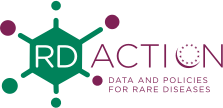France
Visual Recap
Contributor‘s names
Summary of Rare Disease Activities in France*
(Full report to follow below)
France was the first EU country to adopt a national plan for rare diseases back in 2004 for the period of 2004-2008, which was evaluated and succeeded by a Second National Plan for Rare Diseases (2011-2014). The third National Plan for Rare Diseases is being prepared during the period 2017-2018, and will cover the years 2018-2022. This 3rd National Plan is being elaborated through the collaboration of a multistakeholder group which meets regularly, and involves health professionals (clinical, medico-social, and research-oriented), patient associations, learned societies, and representatives from all relevant administrations. Alongside this rare disease framework, France approved a Second National Plan for Cancers (2009-2013) -which included rare cancers- and a National Plan for Genomic Medicine 2025 (adopted in 2016).
Orphanet, the global portal for rare disease information was established in France back in 1997 and the 41-country Orphanet consortium continues to be coordinated from the INSERM (National Institute for Health and Medical Research).
France has a clear and transparent organisation for the diagnosis, treatment and care of rare diseases, developed over numerous years. There are two official categories of ‘centres of expertise’, namely Centres of Reference and Centres of Competence which each have particular roles and criteria. A national endorsement for the period 2017-2022 was realized in 2017, meaning that France has 387 Centres of Reference and 1844 Centres of Competence. At the heart of the French system are 23 national Rare Disease networks -the ‘filières de santé maladies rares’ (FSMR) – which were established in 2014. These Networks connect centres with expertise in the same broad disease areas. The filières represented an important precedent for the European Reference Networks (ERNs), 5 of which are now coordinated by French centres.
France promotes a particular focus on integrated, holistic care for people with rare diseases, through various activities; for example, it adopted a National Plan for Rare Disabilities (2009-2013), and the future 3rd National Plan for Rare disease will include the issue of improving quality of life of patients.
France has adopted a particular approach to the generation and use of Clinical Practice Guidelines: in December 2012, the Health Independent Authority Agency (HAS) published a simplified methodology to allow Centres of Reference (and only these Centres) to produce Guidelines –known as PDNS (translating to National Protocols for Diagnosis and Care) – more quickly. At present 40 of these PDNS are available online.
The creation of a national registry for all rare diseases has been a priority for France in recent years, and indeed was a key goal of of the 2nd NP. The Banque National de Données Maladies-Rares (BNDMR) is seeking to collect an agreed minimum dataset for all rare disease patients seen by all CoR and CoC, and is now being implemented. The neonatal screening programme currently tests for 5 rare diseases, but new legislation due in 2018 is expected to expand this offering. Molecular genetics laboratories in France have been organized over the last 15 years into networks dealing with testing for specific diseases or groups of diseases, a process overseen by the National Association of Molecular Genetics Practitioners (ANPGM).
Centres of Reference and the Filières play a key role in the provision of educational courses and training sessions on rare diseases; as of 2015, each CoR had delivered on average over 60 therapeutic educational sessions. There are numerous sources of information and support for rare disease patients including a national helpline and an extensive library of resources produced by the national Orphanet team.
Rare Disease research has been a priority in France for many years. The Health Ministry and the Research and Innovation Ministry collaborate to promote fundamental, translational and clinical research. The Health Ministry supports and facilitates rare disease research, through ca. 15-20% of its research programmes. Also, for the year 2016, 34 million has been dedicated by the National Research Agency, 3 million by the Rare Disease Foundation, and 192 million by the AFM Telethon, for rare disease research. France has coordinated E-Rare -the ERA-NET for rare diseases- since 2006, from its 1st to 3rd incarnation. As well as participating to IRDiRC (the International Rare Disease Research Consortium), France leads the scientific secretariat. Most recently, France is coordinating the application to establish a European Joint Programme Co-Fund for translational rare disease research, with an emphasis on ‘bench to bedside and back again’, and will coordinate the Programme itself if successful.
Full 2016-2017 Report on Rare Disease Activities in France
*NB – The findings and conclusions in this report are those of the contributors and validating authorities, who are responsible for the contents; the findings and conclusions do not necessarily represent the views of the European Commission or national health authorities in Europe. Therefore, no statement in this report should be construed as an official position of the European Commission or a national health authority
Members of the Data Contributing Committee:
- National Competent Authority Representative: Muriel Eliaszewicz/Anne Chevrier
- Orphanet Representative: Dr Ana Rath
- National Alliance of Patient Organisations Representative: Alain Fontaine





























